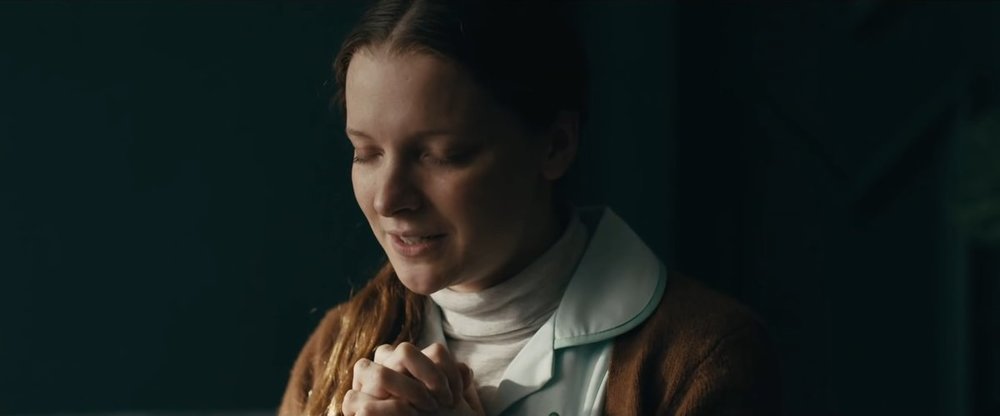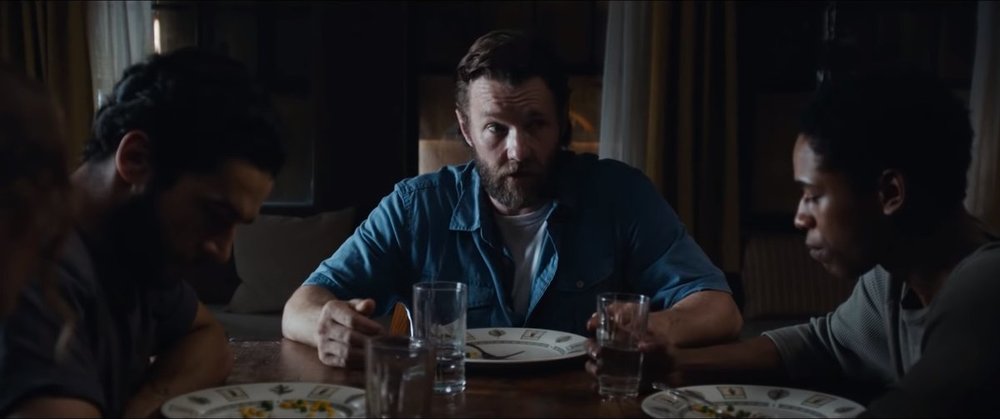Search the Community
Showing results for tags 'Film School'.
-
Hey there everyone! I am a colombian film student and wannabe cinematographer and I am looking for some advise for an upcoming short film me and some classmates are preparing. So I am going to be the DP for this short and in terms of lightning I am looking to have an aesthetic close to the images I attached below for the interior daylight scenes. Logic tells me that to achieve this I should have some strong key lights motivated from the windows on the characters and expose to those bright areas of the face, so everything else will be darker to achieve that high contrast ratio. We´ll probably have like 2 or 3 arri 1000 and maybe like 6 arri 650, it really depends on what the faculty will have available at the time and the budget that production will give us (which will be very, very low). So really I want to have a realistic view of our lightning capabilities with such few lights, can I achieve this look with the lights that are available? If so, what tips can you guys give me to achieve it on an extremely low budget? One of our likely sets is a house with really big windows, so one of the strategies I came up with is partially blocking some windows to control and limit the entrance of light (because it may be too much and spreading everywhere). Am I thinking about this the right way or am I completely off? Thanks in advance!
-
Hi, I'm planning on applying to a film school this summer, for a directing course. My main focus has always been directing, with cinematography being both a fascinating hobby and something I've had to do for the ultra low budget films I've made. Now, the requirements are that you submit at least two films, of which at least one "made on film (16mm, super 16mm or 35mm)". I've got plenty of digital films to submit, but nothing on film. So I have to make a new one. I've never shot anything on film and, as much as I'd like to have this experience, it would be very expensive. Even with clearance stock, if you factor in renting the camera, developing, scanning, then making the final prints, it would run into the thousands. So I've thought that, since I would be scanning the film anyway and edit it in an nle, I could forgo shooting on film and shoot digitally instead, making a final print on film. The Blackmagic Pocket Cinema Camera has the right sensor size, dynamic range and resolution, so the way I figured, it would look very close to film. And the grain would be in the final print anyway. Might be a weird or crazy plan, but that's why I'm running it people who've worked on film before. Any suggestions welcome! Thanks, Paul. P.S. Regarding the ethics of it, I'm applying to a Directing course. Directing is the same, no matter the medium. If it was a Cinematography course it would've been a different story, but as it is, I seems like a pretty random requirement.
- 19 replies
-
- film school
- 16mm
-
(and 3 more)
Tagged with:
-
Kodak and UFVF Honor Students From Singapore, Poland and United States ROCHESTER, NY (August 10, 2015) - Kodak has named five students as award winners in the 2015 KODAK Scholarship Program, a global competition held annually in collaboration with the University Film and Video Program (UFVF). This year, the Program received a record-breaking number of applications, with over 55 film schools from around the world nominating students for the KODAK Student Scholarship and KODAK Student Cinematography Scholarship. Winners received their prizes at the University of Film & Video Association (UFVA) Conference on August 8, at American University in Washington, DC. "Kodak is fervently devoted to the next generation of filmmakers," said Andrew Evenski, president and general manager of Kodak's Entertainment & Commercial Films, "and partnering with the UFVF keeps us closely connected with the institutions teaching these up-and-coming artists. We continually see a tremendous interest from students in producing their projects on film. Many of them grew up shooting digitally, and are now enthusiastic about capturing their images with the magic of celluloid. Creating product grants and scholarships is one way Kodak can help ensure they achieve that opportunity." Award-winning cinematographer John Bailey, ASC led the judging panel, which evaluated entries based on sample reels, faculty recommendations, and academic achievements. The three 2015 KODAK Student Scholarship Program Award winners are: Gold Award ($5,000 tuition scholarship award and $5,000 KODAK Motion Picture product grant) - Max Bessmertnyi from New York University's (NYU) Tisch School of the Arts Asia in Singapore for his film The Tricycle Thief. Silver Award ($4,000 tuition scholarship award and $4,000 KODAK Motion Picture product grant) - Paulina Skibinska from National Film School in Lodz, Poland for Object. Bronze Award ($3,000 tuition scholarship award and $3,000 KODAK Motion Picture product grant) - Matvey Fiks from School of Visual Arts in New York for Babushka. The two 2015 KODAK Student Cinematography Scholarship Award winners are: First Place ($4,000 tuition scholarship award and $5,000 KODAK Motion Picture product grant) - Nicolas Aguilar from Chapman University, California, for his cinematography on Run. Award of Merit ($1,000 tuition scholarship award and $3,000 KODAK Motion Picture product grant) - Ziryab Ben Brahem from San Diego State University, California, with Wake. With a mutual passion for education, Kodak collaborates with the UFVF to ensure this program is possible. The UFVF is a not-for-profit organization that engages in and promotes worldwide education, research, innovation, and charitable activities in the arts and sciences of moving images and aural communication. "We are honored to recognize the work of these talented filmmakers, and delighted to put film into their hands and see where they take us," added Evenski. "With studio agreements in place and the recent launch of several Kodak programs to support every budget, artists - from students to award-winning filmmakers - can confidently choose film to fulfill their vision." For more information, visit www.kodak.com/go/education.
-
Hello all, Within the past few years, I've been hearing that getting a film degree won't actually get you anywhere in the industry, only the people you know and the talent you have can. Well, does the same apply for a producer? Merely curious.
- 16 replies
-
- film school
- degree
-
(and 5 more)
Tagged with:
-
I was recently accepted to both UCLA and USC's film schools but I am having a very, very tough time making a decision. I will be a freshman this fall and I'm 100% sure I want to be a filmmaker. Throughout my life I have always been interested in writing. I started writing short stories in elementary and transitioned to writing screenplays in high school. My major for UCLA is Film & Television and my major for USC is Film & Television Production. I'm especially interested in Screenwriting, Directing, and Editing though I know I won't be able to declare concentrations until my junior year at the earliest. Also, I am from California so even though USC is more expensive, out of state tuition is not a factor. UCLA has been my dream school since I was nine years old so I'm completely incapable of making a non-biased decision here. Both are great schools which doesn't make this any easier. I love UCLA's campus and the creative freedom that comes with their film program a lot more than USC's, but USC comes with the trojan mafia which opens so many doors all on its own. I'm really stuck here and any advice would be helpful.
-
Hello, I will be graduating film school in less than two months. I am, of course, an aspiring camera assistant. I am having a hard time deciding where to move after I graduate. The school I attend is located in Florida which has little to no film industry anymore. I have no choice but to move. Based on your experience or knowledge...where would be the best place for me to move to get starting jobs such as Camera PA/Trainee gigs? LA? Atlanta? I know that there is really no right or wrong place to be...I just need a little bit of guidance. Thanks. :)
- 8 replies
-
- camera trainee
- LA
-
(and 4 more)
Tagged with:
-
Hi, I'm going to Film school in 2017 ( University) , now i have 3 years off to enjoy my life :))) i'm looking for online film school teaching about cinematography , camera, lens, light,...( not too much about VFX or animation ) that is helpful and will give me a certificate or st but that doesn't important. I want to take classes to gain knowledge and experience to have a strong background to go to Film school in 2017. I'm willing to pay money to access those courses. Do you suggest any trusted sites or schools ? i found http://www.lightsfilmschool.com/ , anyone has any ideas about them ? Thank you so much
-
Five Film School Students Awarded KODAK Scholarships
Sue Smith posted a topic in Cinematography News
LOS ANGELES - Kodak and the University Film and Video Foundation (UFVF) have announced the recipients of the 2014 KODAK Student Scholarship Awards and KODAK Student Cinematography Scholarship Awards. The presentation was made Saturday night during the annual banquet and awards ceremony at the University Film and Video Association (UFVA) Conference, which was held last week at Montana State University. Kodak's annual global competition is designed to recognize emerging talent that demonstrates superior filmmaking skills and creativity. Selected by a panel of judges led by award-winning cinematographer John Bailey, ASC, this year's winners represent film schools in Hungary, Russia, Singapore, and the United States. The KODAK Student Scholarship Program Award winners are: Gold Award ($5,000 tuition scholarship award and $5,000 KODAK Motion Picture product grant) - Timothy Yeung from New York University's (NYU) Tisch School of the Arts Asia in Singapore for his film 90 Days. Yeung wrote, directed and produced the drama. Silver Award ($4,000 tuition scholarship award and $4,000 KODAK Motion Picture product grant) - Dustin Brown from Santa Monica College in California for Solidarity. Brown was writer, director, producer and editor of his narrative. Bronze Award ($3,000 tuition scholarship award and $3,000 KODAK Motion Picture product grant) - Anton Moiseenko from the Russian State University of Cinematography (VGIK) in Russia for his piece Experience of the Celestial Bodies. Moiseenko wrote and directed the documentary. The KODAK Student Cinematography Scholarship Award winners are: First Place ($4,000 tuition scholarship award and $5,000 KODAK Motion Picture product grant) - Balaji Manohar, also from Tisch Asia, for his cinematography on Little Master. Honorable Mention ($1,000 tuition scholarship award and $3,000 KODAK Motion Picture product grant) - Balász István Balász from the University of Theatre and Film Arts in Hungary for his visuals on House. Kodak partners with the University Film and Video Foundation to make this program possible. The UFVF is a not-for-profit organization that engages in and promotes worldwide education, research, innovation, and charitable activities in the arts and sciences of moving images and aural communication. Accredited film schools around the world nominated up to two students for consideration for the KODAK Student Scholarship, and one cinematography student for the KODAK Student Cinematography Scholarship. The cinematography student nominee could also be nominated for the KODAK Student Scholarship Award. They were judged on a combination of past work, faculty recommendations, and academic achievement. Judging took place in July. In addition to Bailey, the entries were judged by Melinda Levin, a professor at the University of North Texas and president of the UFVF, and Kodak's Lorette Bayle, who is also an award-winning filmmaker. Kodak introduced its worldwide film school program in 1991. Through the years, the program has grown to include a wide range of initiatives to help both students and educators enrich the development of their skills in the art and craft of filmmaking. For more information, visit www.kodak.com/go/education.- 1 reply
-
- Kodak
- scholarship
-
(and 3 more)
Tagged with:
-
Does anyone know if these schools are reputable and a good place to go for film? Just trying to narrow down my list. So far I have Columbia college hollywood FullSail SCAD University of Advancing Technology
- 6 replies
-
- Film school
- Student
-
(and 2 more)
Tagged with:
-
LOS ANGELES - The American Society of Cinematographers (ASC) has chosen three winners for the 2014 ASC Linwood Dunn Student Heritage Awards. The honors were announced last night during a ceremony at the organization's clubhouse here. Designed to showcase the artistic abilities of the next generation of filmmakers, the recipients were noted for their cinematographic abilities. The winning students and their projects are: Graduate Award: WINNER: Guy Pooles from the American Film Institute (AFI) Conservatory for "Dirty Laundry" Undergraduate Award: WINNER: Harper Alexander from University of North Carolina School of the Arts for "Starlight" Documentary Award: WINNERS: Matthew Blake of Chapman University for "Forest Keepers" "Congratulations to all our student award nominees and winners," said ASC President Richard Crudo in his remarks at the awards ceremony. "This is a great moment in your lives and one you will always remember fondly. I urge you to make the most of it and to continue working hard toward your goal of becoming a cinematographer." Each year, the ASC Heritage Award is rededicated in memory of an individual who advanced the art and craft of cinematography. This year's Heritage Award is dedicated to the memory Linwood Dunn, ASC. Twice elected ASC president, Dunn was also a governor of the Academy of Motion Picture Arts and Sciences in two different branches, and was instrumental in the formation of the Academy's Visual Effects branch. His many accolades include an Oscar® for visual effects in 1949 for the original "Mighty Joe Young," the Academy's prestigious Gordon E. Sawyer Award, and the ASC Presidents Award. Always keenly interested in technology, Dunn was an inventor at heart and a true filmmaking pioneer; his innovations include the first zoom lens and the first optical printer. At age 93, he was involved in the development of digital projection. The Linwood Dunn Theater in Hollywood was named for his contributions to the motion picture industry. To qualify, instructors at film schools recommended two students for each category from their school, who then submitted their film for judging. A Blue Ribbon panel of ASC members judged the entries. For additional information about the ASC, visit www.theasc.com, or join ASC on Facebook at http://www.facebook.com/AmericanCinematographer and Twitter (@AmericanCine).
-
- filmmakers
- ASC
-
(and 1 more)
Tagged with:
-
Hi Friends, I am professional photographer working from last 3 years and living in India. I have started doing DSLR videos a year back like events, short films, wedding films music videos & behind the scenes. I am really interested in pursuing a one/two year course in cinematography. Any1 had been to film schools for cinematography In Los Angeles.How was the experience ? Is it worth going there? I am really interested in shooting travel work. As an international student how are work opportunities in Hollywood? After graduating how long can we work there? Currently I have applied for FAMU and gonna apply for NFTS as well. I have already heard about USC CHAPMAN AND UCLA but the duration is 3 years. Need advice
-
- film school
- cinematography
-
(and 4 more)
Tagged with:
-
So I am still very new to film making. Last year the only camera I had was a GoPro and I decided that I wanted to do CInematography for the rest of my life so I decided to skip DSLRs and by a blackmagic cinema camera. I have spent the past 4 months learning how to film and colorgrade and I finally feel ready to start getting audio but I have no idea what to mics and audio equipement to buy? Does anybody know what mics I should get if I want to get good audio and keep the camera run and gun. I'm in college and I film by myself so I want to be able to just throw all the gear in my backpack show up at location and be ready to shoot in 2-5 minutes. My budget for audio is $500-$600.
-
Hi guys I graduated last week andnow I'm looking for a master in europe. Unfortunately tuition fees for an MA in cinematography are really expensive more than 10 thousand euros. Instead fees for Brighton Film School and Baltic Film and Media School are affordable. Anyone knows something about them? would you recommend them? Do you know other schools which provide a good education? Thanks in advance
-
- film school
- univesity
-
(and 8 more)
Tagged with:
-
Hi guys! Met Film School have just launched a new course in cinematography They usually offer short courses (basic and advanced) but this is an intensive 6-month course in practical cinematography skills: http://www.metfilmschool.co.uk/courses/one-year-courses/six-month-cinematography.aspx Hardly any time in the classroom- very practical.
- 7 replies
-
- cinematography course
- London
-
(and 1 more)
Tagged with:
-
Hi Everyone! Looking for some information! I'm an Australian researching a move to Europe to study script writing. My two passions are actually script and set design and I'm looking for film schools that offer great hands on courses. I completed my undergraduate degree with a minor in film and am now looking for some further study opportunities to expand my script writing experience. It doesn't have to be a master's, just an opportunity to write and make new connections in film. Thanks for your time! Kind Regards, Adrianna
- 1 reply
-
- english
- scriptwriting
-
(and 8 more)
Tagged with:
-
Hello Everyone, My name is Alex Mitchell and I am an aspiring camera-assistant hoping to hit the ground running after I graduate from my film school (FSU Film) in December. I've spent over 3,000 hours on set working both ATL and BTL jobs on professional and film school sets. I chose to specialize in camera-assisting because it combines my best qualities into one job: a deep passion and knowledge of cameras and lenses, appreciation for capturing beautiful moments (in focus!), and endurance. I read the blogs on this site and I love all the knowledge you all share, and I was hoping if you could share with me some of your knowledge. I plan on moving out to L.A around January 2014 after I graduate and start working as a freelance camera assistant. I already have some connections through my film school but I would like to work someplace where I can connect with other professionals too. I would like to land an internship/job working at Panavision or any other camera rental house. I know they don't just hand out those jobs, but I'm determined to get one. If you have any type of advice for someone like me please let me know. I have a couple of months before I move out there, so I am just gathering information that will help me down the road. My resume is on my website if you'd like to check it out and I'll attach it onto this thread too for your convenience. Thank you for you time and I look forward to your responses. alexmitchellfilm.wix.com/apictureisworth Film Resume.pdf
-
- panavision
- freelance
-
(and 5 more)
Tagged with:
-
Hey im still in highschool just going into grade 12 i live in canada and was wondering which film school to go to. I know the everyone says that Ryerson is the best in canada but i just feel like its more theory then hands on (i know that you do do films and such but not as much). My other thoughts were the new york film academy in the US and the national film and television school in the UK. I feel like those schools are a lot more hands on and getting set experience when ryerson is more this is how film began kinda stuff. So my question really is is it worth the extra money to go to a film school outside of canada? Thanks, Eric
-
Anyone that has applied to the cinematography course this year (starting Jan/Feb 2014)? Heard a few people have got replies saying they have not got in, but I havn't heard anything? Wondered if others had?
-
- nfts
- film school
-
(and 3 more)
Tagged with:
-
I just toured Columbia College Chicago and was considering finishing a BA in Cinematography there. I was wondering if it's worth it to go through their program or just save the money. It seems like they have a lot of internship/networking opportunities, especially through their alumni. Any thoughts on the school?
- 5 replies
-
- Film School
- columbia
-
(and 4 more)
Tagged with:
-
Hello everyone. I am having trouble finding film schools which can help me work out my problem. I live in India and I don't wish to continue my studies here which is why I am looking for film schools around the world. German schools are an option as I am learning German. But languages other than Spanish, German and French are out of question as there are no centres for the same. I am looking for some good film schools for learning Cinematography but with the tuition fee under 30,000 USD. Now this might sound stupid but the reason behind is my parents are not willing to invest any more than that amount. Although I did find and apply to a few schools but I need to apply to more of them so there will be a chance of getting admission in one. Any kind of information and guidance will be helpful. Thank you people.
- 1 reply
-
- inexpensive
- low-cost
-
(and 3 more)
Tagged with:
-
Happy holidays to all! I'm a TVC Producer from Singapore and about to embark on a new challenge. I would like to pursue my passion of cinematography. I do not have any fundamentals on it and was wondering if I should join film school. I was looking at the 1 year Conservatory in Cinematography offered by NYFA. Link below; http://www.nyfa.edu/cinematography-school/1year.php What do you guys think? Is it a good idea to join a short course like this to learn the fundamentals or try and intern/understudy a DOP here? I spoke to a DOP here and he suggests I study and try and get into the camera department at the same time. Would NY offer work during my free time at school? Need your thoughts, guys. Thanks.
-
Hey everyone, I am currently active duty military. I will be getting out in June 2013 and moving to Los Angeles to go to film school. I want to be a director, but I want to learn every aspect of filmmaking. I understand people believe you don't need film school, but the GI Bill will pay for mine, so I'm going. Originally I was set on going to "Los Angeles Film School" because my friend went there a few years ago and is still working in LA. Now that I have done research on the place, it doesn't sound so good. I am researching many schools in that area now, but I have very limited college credits and no SAT scores. So basically I will need to attend a school that will accept me no matter what, or has low acceptance standards. Any advice or comments are welcome!
- 1 reply
-
- Film school
- Los Angeles
-
(and 3 more)
Tagged with:
-
Is anyone actually on this forum? I'm applying to the new FTMA program at Sacred Heart University. It's a one year master program. Has anyone heard of it? They say they focus on story and technique for the new media market. I like it but it's in it's first year. This could be good or bad. Thoughts?
- 1 reply
-
- Student film
- film school
- (and 7 more)
-
Hey guys! I just joined this site today and am hoping to learn a lot and connect with a lot of people. Currently I'm 15 and in the 10th grade and have a passion for cinematography and filmmaking. I've been video editing for years but more recently (roughly 1 1/2 years ago) got serious about it. I've started working more with the film aspect of filmmaking this year as I'm now taking an AV Production class at my school and i'm loving it. I've always been working in post but have only more recently starting to do more things with cinematography. So anyways, I was wondering if film school was really worth it? I know quite a lot of things already about cinematography and film production and from this site and others I could learn so much more, without having to go to film school. Many people say that it's a waste of money and unless you're going to film school with very little to no knowledge of filmmaking, then I'd probably agree. But I want to hear from some people on here who have had experience. I'm also starting to make some connections with music video editors/directors and independent cinematographers so I can get help from them as well. I'll also post some of my work from youtube on here when I get the chance and I've recently made a vimeo so I will post it there as well. Thanks and I look forward to connecting with a lot of you!
- 6 replies
-
- film school
- independent cinematographer
- (and 6 more)








